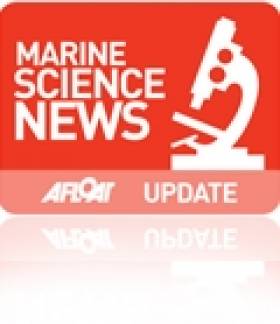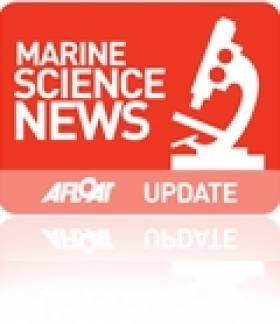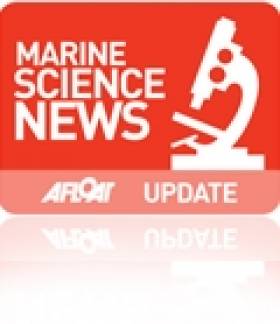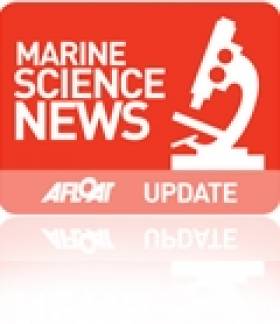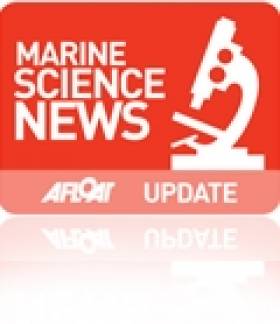Displaying items by tag: marine science
#MarineScience - Applications are now invited for the Atlantic Summer School 2014 to be held on board Irish national research vessel RV Celtic Explorer from 11-17 September.
The school is a collaboration between the Strategic Marine Alliance for Research and Training (SMART) and the Alfred Wegner Institute for Polar and Marine Research (AWI), with ship time provided by the Marine Institute, and is open to all marine-related postgraduate students (MSc and PhD) from across the island of Ireland and Germany.
The 2014 Summer School aims to build capacity in offshore marine research by providing early-stage career scientists with the knowledge and skills necessary to act as chief scientists on research surveys.
Participants will conduct a multidisciplinary investigation of cold water carbonate (CWC) ecosystems off the Belgica Mound Province, which is a Special Area of Conservation (SACs) approximately 100km southwest of Ireland.
In addition to the five days of seagoing research, the school includes pre-survey meetings via Skype, pre-cruise preparation in Cork and post-survey data analysis and reporting in Galway.
Course content will include:
- Pre-survey meetings and lectures on the study site, SACs and CWC ecosystems.
- Practical shore-based workshop designing and planning the survey.
- Deployment and operation of novel equipment and instrumentation.
- Acquisition, processing and archiving of samples.
- On-board evening survey meetings and lectures.
- Post-survey data processing, analysis and open source publishing.
- Reporting initial findings through working groups.
The collaboration is designed to forge mobility pathways for early career researchers between Ireland and Germany and serve as an excellent networking opportunity for all participants.
This is the first of a series of summer schools that will alternate between Irish and German research vessels, with the 2015 school taking place on the RV Heincke.
Training will be overseen by experts from University College Cork, NUI Galway, University of Ulster, Alfred Wegner Institute and SMART.
Online application forms must be completed and received by 5pm CET on Friday 6 June 2014.
For further information and an online application form please visit the Atlantic Summer School website or contact [email protected].
Please note that all travel and shore-based accommodation costs are the responsibility of summer school participants. Successful applicants must have or plan to secure a valid Medical Certificate approved by the state (ENG11 in Ireland) and Personal Survival Techniques (PST) certificate approved under the STCW 78/95 convention.
Irish–Newfoundland Transatlantic Research on RV Celtic Explorer
#marinescience – The RV Celtic Explorer leaves Galway today (12th April) for Newfoundland and Labrador, on its fourth multi-institution transatlantic survey. The 13 day expedition across the Atlantic to St Johns, Newfoundland will involve four scientists from NUI Galway, as well students from UCC and GMIT. A team of six of scientists lead by Dr. George Rose from the Fisheries and Marine Institute of Memorial University, Newfoundland, will work alongside nine Irish scientists during the voyage.
The collaboration with Newfoundland and Labrador builds on the strong relationship established since the first Newfoundland survey on the Celtic Explorer in 2011.
"Such cooperation is key to improving our ocean wealth and promoting the sustainable management of its resources. It's hugely important for Ireland and brings us closer to achieving the goals of the 'Galway Statement on Atlantic Ocean Cooperation' signed here at the Marine Institute Galway last May by the EU, USA and Canada ", said Dr. Peter Heffernan, CEO Marine Institute.
Irish scientists onboard will study the rich and diverse pelagic ecosystem across the Atlantic Ocean. "Marine scientists from NUI Galway will study the oceanography and the deep scattering acoustic layers of the water columns using multi-frequency acoustics. This is then related to zooplankton abundance and ultimately to fish abundance, providing us with a better understanding of the ecosystem," explained Dr. Louise Allcock from NUI Galway.
Scientists from Galway Mayo Institute of Technology will study plastics found in the ocean. Micro-plastic debris is made up of tiny plastic granules, fibres and fragments less than 5mm in diameter. Although plastics are beneficial materials, micro-plastics appear to be pervasive in the ocean and scientists do not yet fully understand the impact that small plastic particles can have on the food chain. Ingesting the tiny particles may be toxic to the animals, and may prevent them from consuming their natural prey.
"We hope this research will help to raise awareness of the effects of plastics in the ocean and provide better ecosystem assessments across the Atlantic," said Ms Amy Lusher from Galway Mayo Institute of Technology who is completing a PhD on this topic.
Seabird and marine mammal observations will also be conducted by Aoife Foley from Galway Mayo Institute of Technology and Ashley Benison from University College Cork. These animals are considered top predators in the pelagic environment and the abundance of fish and zooplankton, their prey, ultimately affects their distribution and survival.
The Newfoundland team of scientists will continue their strong collaboration with the Irish scientists. "This collaboration is now into its 4th year with a major paper based on linking acoustic, biological and oceanographic data from 2011-2013 presented at the recent international Marine Science Conference in Hawaii," explained Dr Rose.
Sharing information and experiences with scientists from both sides of the Atlantic allows Irish researchers to forge strong links with our Newfoundland and Labrador – Canadian counterparts.
"Being the western and eastern bookends of the North Atlantic, and given our shared history, it seems only right that Newfoundland and Ireland scientists should work together on problems of mutual interest, and this has indeed proven to be very enjoyable and highly productive" Dr. Rose further stated.
New Call For Ship Time On Irish Research Vessels
#MarineScience - The Marine Institute has announced an additional call for funded ship time on the RV Celtic Explorer and the RV Celtic Voyager.
Applications are invited from research performing organisations including higher education institutions, public research bodies and industry to carry out ship-based research activity.
The areas of research may relate to: ecosystems approach to marine resource management; seabed processes and resources; climate/environmental change; renewable ocean energy; biodiscovery/biodiversity; novel marine technologies; and marine policy/legislati
Applications from early stage researchers, including PhD students or early post-doctoral researchers, are particularly encouraged to apply, to allow emerging marine scientists the opportunity to gain hands-on experience in undertaking ship-based research.
Applications will only be accepted for a limited number of days - one week in September 2014 on the RV Celtic Explorer, and up to three weeks with available dates in July, September, October and December 2014 on the RV Celtic Voyager.
The closing date for receipt of applications is 3pm on Thursday 17 April 2014. Applications must be submitted using the Research Vessel Operations' online Survey Planning System (SPS) and Research Information Management System (RIMS), which are available on www.marine.ie. (Please contact the Research Vessel Operations team at [email protected] to obtain a password for SPS.)
The Vessel Charter Guidelines 2014-1015 (Word doc 253KB) should be read carefully before submitting the Ship-Time Application Form.
Applicants may seek grant-aid to cover all or part of the vessel charter costs for research surveys. For information on eligibility for grant-aid and how to apply, read National Research Vessels 2014 Ship-Time Programme Grant Aid Guidelines (PDF 577KB).
#oceanology – The Marine Institute is at Oceanology International 2014 in London this week (11-13 March) promoting Ireland's fast growing marine technology sector and highlighting the opportunities to do business in Ireland.
Ireland's SmartOcean Pavilion (stand B500) sponsored by the Marine Institute showcases a range of products and services, such as smart control technologies for subsea remotely operated vehicles; subsea power cable fault finding; innovative data buoy and anti-fouling wiper equipment; and adjustable 'clutch fins' technology that can potentially double the output of wave energy devices.
Exhibitors at the Ireland Pavilion represent Ireland's growing SmartOcean cluster with displays by Mobile and Marine Robotics Research Centre (UL), SmartBay Ireland, Geomara, Jospa, IDS Monitoring, as well as INFOMAR (the Irish strategic National Seabed Survey by the Geological Survey of Ireland and Marine Institute), and Research Vessel Operations at the Marine Institute.
Dr. Peter Heffernan, CEO, Marine Institute said:
"We're delighted to take part in Oceanology International 2014 alongside some of Ireland's marine technology innovators. Ireland is a great place to do marine business right now, with a growing number of high tech marine and ocean energy companies developing novel products and services for international markets. And together with our national marine test-bed infrastructure in Galway Bay, Ireland is an ideal location to test and validate marine energy and subsea technologies."
The Marine Institute continues to develop Ireland's national marine test and validation facility for marine energy and subsea technologies in Galway Bay. The subsea observatory will include a standard telecommunications cable to provide power and high speed data communication between the shore station and a network of subsea data ports and surface buoys at the test site. The project is a national collaboration between the Marine Institute, SmartBay Ireland, Sustainable Energy Authority of Ireland and Hydraulics and Maritime Research Centre (UCC).
At OI2014, SmartBay Ireland is actively seeking companies with technology prototypes who wish to use this facility to test and validate novel sensors and equipment, for example Wave Energy Converters, Subsea Sensors, Data and Communications systems.
Visit us at the Ireland Pavilion to explore opportunities emerging through local and international initiatives such as Horizon 2020. Ireland is well positioned to work with Atlantic partners in the sustainable development of our ocean resource.
Ireland's SmartOcean Pavilion at OI14 supports the achievement of key actions from the Governments Integrated Marine Plan, Harnessing Our Ocean Wealth. A Development Task Force was set up last December, appointed by Minister Simon Coveney to progress these actions including: promoting Ireland as a good place to do marine business and supporting new and existing marine test and demonstration facilities.
Marine Institute Stands Over Salmon Study
#FishFarm - The Marine Institute says it stands over the "quality and accuracy" of its research into the environmental impact of the proposed Galway Bay fish farm as the journal behind an alternative report acknowledged it had erred in its publication.
Last August the institute spoke out over "inaccuracies" in a news story citing a paper in the Journal of Fish Diseases, which was described as identifying "fundamental errors" in the Marine Institute's (MI) research on the potential impact of salmon farming on wild salmon numbers in the region.
The MI-sponsored study was submitted to Brussels by the Department of the Marine to support the case for Bord Iascaigh Mhara's (BIM) 500-hectare organic salmon farm planned off Inis Oírr in the Aran Islands.
This was despite concerns expressed last summer by Inland Fisheries Ireland that the research was based on flawed methodology.
However, the Journal of Fish Diseases has since issued an apology for presenting its report on the Marine Institute's research as having been peer reviewed. It has since been reclassified as 'comment', and the journal has published a rebuttal by the Marine Institute.
In a statement this week, Marine Institute chief Dr Peter Heffernan defended the science behind its research, saying: "The methodology and statistical analyses used in the original Marine Institute paper is the accepted scientific approach, allowing for robust findings."
He also claimed that the comment piece criticising the MI's research "was based on an analysis of just 56 summary data points as opposed to over 352,000 individual data points used in the Marine Institute analysis."
Dr Heffernan added: "As the national agency responsible for marine research, we stand firmly over our science."
The Marine Institute's statement comes as the fish farm controversy returns to the news agenda, with the Irish Examiner reporting on the European Commission's ongoing investigation of conflicting scientific studies related to the scheme, after Brussels called a halt to BIM's plans last November.
As previously reported on Afloat.ie, it will be at least six months before any decision is made by Government on the Galway Bay fish farm proposals.
Science@Sea Training Opportunities Onboard RV Celtic Voyager
#MarineScience - The Strategic Marine Alliance for Research and Training (SMART) has opened the call for applications for Science@Sea research vessel-based training courses.
Courses are aimed at undergraduate and postgraduate students of marine-related science, technology and engineering, as well as researchers and professionals working in the marine sector.
The two-day training courses will be held between 4-9 April 2014 in waters off Cork and will offer students the opportunity to gain practical, hands-on experience onboard the national research vessel RV Celtic Voyager.
Science@Sea introduces participants to the concept of a multidisciplinary research approach through immersion in key disciplines. Training addresses the practical, cross-disciplinary skills necessary for marine sampling, data collection and processing.
Participants gain hands-on experience in deployment of a wide range of instrumentation and deck equipment as well as other areas essential to working at sea, including survey design and planning, safety at sea and post-survey analysis and assessment.
“Science@Sea is unique in that it provides participants with the relevant technical knowledge and skills required to work and carry out research at sea. This not only increases national capacity in the marine sector but provides participants with the vital knowledge and skills required for future research and employment," said Dr Pauhla McGrane, national co-ordinator of SMART.
“The hands-on experience that students gain through training provided by the SMART programme is invaluable preparation for the reality of working in a sometimes harsh sea environment across a broad range of marine research,” added Dr Peter Heffernan, CEO of the Marine Institute.
“We’re delighted to support Science@Sea as it gives participants significant practical experience beneficial to their career path, and the SMART programme can contribute towards continuous professional development for professionals with accreditation by IMarEST.”
Applications and further information are available online HERE and queries can be addressed to [email protected].
Completed applications should be received no later than Tuesday 11 March 2014. Please note a course fee of €300 applies for applicants in full-time employment and €50 for full-time students and unwaged graduates with a marine science and technology background.
SMART is a marine science partnership programme that provides quality offshore training for students of marine science, technology and engineering. SMART operates from Galway-Mayo Institute of Technology. Partner institutes include Athlone Institute of Technology, the National University of Ireland, Galway, the Marine Institute, University College Cork and the University of Ulster with supporting funding from the Higher Education Authority. Science@Sea courses are recognised by the Institute of Marine Engineering, Science and Technology (IMarEST) as contributing towards professional development.
Science@Sea is carried out under the Sea Change strategy with the support of the Marine Institute and the Marine Research Sub-programme of the National Development Plan 2007–2013.
New Species Confirmed At Rockall Deep Ocean Gas Vent
#MarineWildlife - Four new species of marine wildlife have been discovered off Rockall, as the Guardian reports.
It was a bonus Christmas present for marine scientists in Scotland who've announced that a handful of the array of deep ocean creatures found at the 'cold seep' methane gas vent in the North Atlantic - namely a large sea snail and two clams - have been confirmed as species new to science.
One of the clams, Thyasira scotiae, and the sea snail Volutopsius scotiae have been named after the research vessel MRV Scotia, while the clam Isorropodon mackayi is named in tribute to mollusc expert David Mackay. A marine worm also discovered is as yet unnamed pending examination.
As previously reported on Afloat.ie, the Rockall vent and its surrounds were discovered by scientists last year and since explored on a number of occasions - their findings prompting the International Convention on the Exploration of the Seas to recommend a ban on fishing in the area around the Rockall basin, 260 miles west of the Hebrides.
The new discoveries come in the same year as Irish researchers celebrate the discovery of an amazing new undersea world in the Whittard Canyon on the Irish Atlantic margin, containing larger than average molluscs that may be up to 200 years old.
Atlantic Marine Research Plan Now Online
#MarineScience - The EU FP7 SEAS-ERA Marine Research Plan for the European Atlantic Sea Basin - Towards a Strategic Research Agenda/Marine Research Plan for the European Atlantic Sea Basin - is now available to view and download online.
The report proposes a vision for each of eight priority research areas and three critical supports/infrastructures to progress the Blue Growth Strategy in the European Atlantic Sea Basin.
For each sector (such as marine renewable energy, fisheries/aquaculture, maritime transport, etc) key research prioritisation exercises are referenced and an indicative list of research priorities identified.
Geoffrey O’Sullivan of the Marine Institute, representing the SEAS-ERA Atlantic partnership, presented the SEAS-ERA Atlantic report at the Lisbon Atlantic Conference from 4-5 December organised by the Portuguese Government to report progress on the implementation of 2011's EU Strategy for the Atlantic and this year's Atlantic Action Plan.
In his presentation, O’Sullivan argued that the SEAS-ERA Atlantic Report represented a source of information on the sectoral research priorities to be addressed in an Atlantic Sea Basin context to support the Blue Growth Strategy.
He welcomed the opportunity afforded to the SEAS-ERA Atlantic partnership to contribute to the development of the Atlantic Action Plan (2014-2020) and acknowledged the support of the European Commission in including the SEAS-ERA Atlantic Discussion Document (2011) on the Atlantic Forum website as background information.
“The real success of the SEAS-ERA Atlantic partnership [was] the input and influence the project had on development of the Atlantic Action Plan, published by the commission in May 2013,” he said.
The EU FP7 SEAS-ERA partnership will host its third SEAS-ERA Strategic Forum in Brussels on 25 February 2014.
The project is a network of European marine research funding organisations (RFOs) consisting of 21 partners and two third-parties from 18 member and associated member states located along the European seaboard in the Atlantic, Mediterranean and Black Sea.
The Marine Institute is a partner and joint lead with the European Marine Board (Ostend, Belgium) of Work Package 6.1: A draft Marine Research Plan for the European Atlantic Sea Basin.
The principle aims of the SEAS-ERA network are to improve co-operation between national competitive marine research funding programmes; to facilitate better co-operation in addressing shared opportunities and challenges; to ensure better use of existing resources and capacities; to bridge identified gaps; to avoid duplication; to jointly fund strategic projects of mutual interest and, in doing so, contribute to the sustainable development of the marine resource and progress the establishment of the marine component of the European Research Area (ERA).
The plan comes online with news that some €200 million has been earmarked for marine research and innovation for the first two years of the EU's Horizon 2020 programme that commences in the New Year.
#marine – The Minister for Agriculture, Food and the Marine, Simon Coveney TD, today launched a public consultation process on the preparation of a Marine Research and Seafood Sector Low Carbon Roadmap. This sectoral roadmap is being prepared in connection with the Minister's proposed obligations under the Climate Change Action and Low Carbon Bill.
The Minister is inviting views from stakeholders to contribute to the formulation of this sectoral roadmap, which will in turn contribute to a national low carbon roadmap.
In launching the consultation Minister Coveney said "It is long recognised that marine science is a critical part of our understanding of climate change. The Gulf Stream and other Atlantic currents have a direct impact on the weather we experience both on land and at sea. The Marine Institute has been engaged in longstanding research on the effects of climate change observed in Irish waters. Through the development of Ireland's Integrated Marine Plan, Ireland is poised to harness our ocean wealth by utilising marine research and innovation to boost Ireland's marine economy.
Ireland's sustainable seafood credentials are increasingly important to the consumer and to the long-term development of the sector. The resources of our marine environment, which our fishermen and seafood producers rely on for their livelihoods, are particularly vulnerable to the changes in our climate and sea-level rise. For these reasons it is important to give stakeholders an opportunity to participate in the development of their sectoral roadmap."
Ireland's seafood and fisheries sectors have high-growth potential and are critically important to the Irish economy. The seafood sector currently employs 11,000 people with annual sales of €700 million. Under Food Harvest 2020, it is planned to increase revenue to €1 billion and employment to 14,000 by 2020.
This preliminary stakeholder consultation runs until Friday 27 December 2013.
Marine Research Gets Funding In Minister's €26M Grand Awards
#MarineScience - Research projects in the marine sector will share in a €26 million grant fund announced by Minister Simon Coveney today (Thursday 28 November).
The projects supported cover a broad range of activities across the agri-food and marine sectors, with research in the latter concerned with applying novel processing technologies to fish.
Several of the projects deal with the health aspect of food, including research on marine peptides for glycemic management.
The minister said: “The agri-food and marine sectors have proven in recent years that they have the capacity to drive our economy through increased employment, value added and export growth and this announcement today of major funding for 51 projects will further build and maintain research capacity and capability in the industry.
"These awards will also provide training for over 80 post-graduate students and contract employment for almost 90 highly trained scientists all of which will be at the disposal of academia, regulators and the food industry going forward.”
The news comes a week after it was announced that marine research would get a special focus under the Horizon 2020 Programme, to be launched in Dublin on 10 December.
Full details of these awards are set out in the appendix attached below.



























